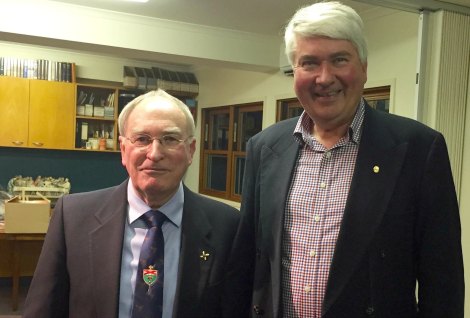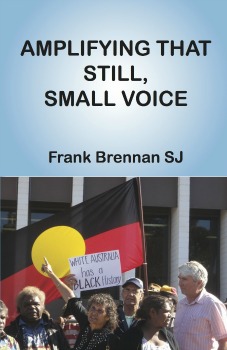Bishop William Morris launches Father Frank Brennan's Book Amplifying That Still, Small Voice.
I would like to begin with the prayer that the national Aboriginal Committee preparing for the papal visit in 1986 composed, and quoted by Frank in his essay, 'Making Room for Aborigines in the Church':
Father of all, you gather us the Dreaming.
You have spoken to us through our beliefs.
You then made your love clear to us in the person of Jesus.
We thank you for your care.
You own us, you are our hope.
Make us strong as we face the problems of change.
We ask you to help all the people of Australia
to listen to us and respect our culture.
Make the knowledge of you grow strong in all people,
so that you can be at home in us,
and we can make a home for everyone in our land. Amen.
In 2010 at the Cannes Film Festival, a French film titled Of Men and Gods, later released in Australia under the title Of Gods and Men, won an award.
 The film powerfully recounts the story of a small monastery of Trappist Monks living in Algeria in the 1990s during the Algerian Civil War. The community of eight monks was like an oasis, a place of peace, welcome and compassion, in the midst of the horror and brutality that existed all around it.
The film powerfully recounts the story of a small monastery of Trappist Monks living in Algeria in the 1990s during the Algerian Civil War. The community of eight monks was like an oasis, a place of peace, welcome and compassion, in the midst of the horror and brutality that existed all around it.
The monks lived humble, simple and happy lives among their Muslim neighbours. They cultivated a garden, kept bees and through their guest-house, extended hospitality, medical care and compassion to all who turned up looking for help.
They made no attempt to convert their Muslim neighbours. The simplicity and generosity of their lives served as a bridge between Christianity and Islam.
As the violence around them escalated, government officials began to urge the monks to abandon their monastery. In their turn, the monks agonised over what they should do. When one of the Muslim Villagers asked one of them what they intended to do, the Brother replied: 'We are like birds on a branch. We just don't know if we will leave.'
However, one of the village women turned the monk's response around saying: 'No, we are the birds, you are the branch. If you go, we will lose our footing'.
Through the simplicity and prayerfulness of their lives, this Trappist community became a 'branch' of God's love and care for both their Muslim and Christian sisters and brothers. They became a sign of God's Spirit through their integrity, through their words of comfort and compassion and, above all, through their unheralded acts of reconciliation, just actions, love and peace.
This is the kind of Church Pope Francis is speaking of when he says in Evangelii Gaudium 49:
'Here I repeat for the entire Church what I have often said to the priests and laity of Buenos Aires: I prefer a Church which is bruised, hurting and dirty because it has been out on the streets, rather than a Church which is unhealthy from being confined and from clinging to its own security. I do not want a Church concerned with being at the centre and which then ends by being caught up in a web of obsessions and procedures.
If something should rightly disturb us and trouble our consciences, it is the fact that so many of our brothers and sisters are living without the strength, light and consolation born of friendship with Jesus Christ, without a community of faith to support them, without meaning and a goal in life.
More than by fear of going astray, my hope is that we will be moved by the fear of remaining shut up within structures which give us a false sense of security, within rules which make us harsh judges, within habits which make us feel safe, while at our door people are starving and Jesus does not tire of saying to us: "Give them something to eat" (Mark 6:37).'
In his collection of essays, Frank has certainly given us plenty to chew on, as he amplified that still small voice in the Church and in the world in the Ignatian tradition to find God in all things and to discern God's presence in the life of every person, through justice, transparency, due process and dare I say love ... for being good or bad is not what it's about. It's about being loved.
In his chapter 6, 'Bring the Church to the World', Frank quotes from Fr John Courtney Murray SJ in the occasional address he delivered for the inauguration as President of fellow Jesuit Kevin Quinn of the Jesuit University, Scranton:
'The spiritual order of society is founded on truth — on the true view of man, his dignity, his duties and rights, his freedoms and obligations. This order must be brought into being under fidelity to the precepts of justice, whose vindication is the primary function of the public power as well as the primary civic duty of the citizenry.
'This order needs to be animated and perfected by love; for civic unity cannot be achieved by public law alone; love is the ultimate force that sustains all humans living together. Finally, this order is to achieve increasingly more human conditions of social equality, without any impairment of freedom'.
In the same essay Frank points out that the Church cannot credibly proclaim a message of social justice in a pluralist democracy when its own processes fall short of ordinary community standards of justice. It needs to turn its teaching about human rights and human dignity back on itself, the Church, insisting on due process within the life of the Church community.
The Second Vatican Council established the tools for this to happen, the Synod of Bishops, which unfortunately has become a consultative body since the Synod on 'Justice in the World' in 1971.
At that Synod, the Synod document was issued by the gathering of the bishops themselves. Father Donal Dorr, writing on the 40th anniversary, speaks of the sharp contrast to what has happened at all the later Synods. At all subsequent gatherings the bishops merely handed over to the Pope the [sanitised] results of their deliberations, and left it to the Pope to issue a document some time later based on whether parts of these deliberations were acceptable to the Vatican.
It is very likely that if this had happened in the case of the Synod of 1971, the final document would not have included its more radical and controversial aspects.
 The first of these is its statement that: 'Action on behalf of justice and participation in the transformation of the world fully appear to us as a 'constitutive' dimension of the preaching of the Gospel, or, in other words, of the Church's mission for the redemption of the human race and its liberation from every oppressive situation.' This word 'constitutive' means 'essential'. So the document is saying that if the Church in any given situation is not working to promote justice, then it is failing to be what Jesus calls it to be.
The first of these is its statement that: 'Action on behalf of justice and participation in the transformation of the world fully appear to us as a 'constitutive' dimension of the preaching of the Gospel, or, in other words, of the Church's mission for the redemption of the human race and its liberation from every oppressive situation.' This word 'constitutive' means 'essential'. So the document is saying that if the Church in any given situation is not working to promote justice, then it is failing to be what Jesus calls it to be.
Certain key Vatican figures mounted a concerted campaign to replace the word 'Constitutive' with the word 'integral'. Those who favoured this view were playing down the central role which the official Church should give to action for justice; they held that the church could still be itself if in some situations its leaders felt it was inappropriate to take a strong stand on justice issues. The wording stayed and on one of his early overseas trips to Brazil, John Paul II, stated that action on behalf of justice is an 'essential' (constitutive) aspect of evangelisation.
The second key element in the document, 'Justice in the World' is its statement that if the Church is to give effective witness to justice in the world, then it must itself be just. It went on to say: 'We ... urge that women should have their own share of responsibility and participation in the community life of society and likewise the Church.' And then: 'We propose that this matter be subjected to a serious study employing adequate means: for instance, a mixed commission of men and women, religious and lay people, of differing situations and competence.'
We are still waiting for that serious study and thanks to the work and advocacy of Frank Brennan as seen in these essays and his work in the public forum, justice has been kept as a 'constitutive' dimension of preaching the Gospel.
Pope Francis' experience in Argentina taught him how important it would be for the whole Church to be involved in the Synod process, if renewal was to happen and the Church's teaching on marriage and family was to be re-clothed to remove obstacles and change attitudes that were 'hiding the face of Christ'. He also remarked that celebrating the Mass and praying with lay people at the Marian Shrine during that time 'gave a live sense of belonging to our people, of the Church that goes forward as the people of God and of us Bishops as its servants' (Tablet, 25 October 2014).
Francis is inviting the whole Church to dialogue with him and to be aware of the temptations faced in dialogue and that were faced by the Synod Fathers as they came together in dialogue and encountered different views. Temptations of inflexibility, to treat the symptoms and not the causes and the roots, not to see the heavy and unbearable burdens people carry, to bow down to a worldly spirit instead of purifying it and bending it to the Spirit of God, to think that we are owners of the faith instead of guardians, to use meticulous and soothing language that says nothing.
Oscar Romero writes in The Violence of Love: 'A Church that doesn't provoke any crisis, a gospel that doesn't unsettle, a word of God that doesn't get under anyone's skin, a word of God that doesn't touch the real sin of society in which it is being proclaimed, what gospel is that?'
It's not the gospel of the 'still small voice', amplified by Frank Brennan in his book or in his life. I believe these essays will provoke, will unsettle, will get under a number of skins.
They enflesh the Gospel and stand in their own right as a living 'fifth Gospel', keeping alive the 'dangerous memory' (Johann Baptist Metz) of Jesus by telling his story as it lives and breathes in the lives of Aborigines, asylum seekers, the dying, and same sex couples, placing the individual's formed and informed conscience at the centre of any work for justice, in the Church's handling of child sexual abuse, the marginalised and the gentle breeze of love, compassion and mercy that amplifies that still small voice.
I take this opportunity to thank Frank for this collection of essays, for his friendship, love and support, assuring him that he always has mine and to commend the book to you as it invites you to act and live justly, realising that life is about being loved.